| Listing 1 - 10 of 19 | << page >> |
Sort by
|
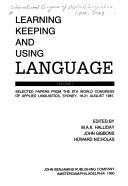
ISBN: 9027220719 9027220735 9027220743 1556191049 9786613592477 902727374X 1280497246 9786613592460 9027273731 1280497238 9789027273734 9789027273741 Year: 1990 Publisher: Amsterdam Benjamins
Abstract | Keywords | Export | Availability | Bookmark
 Loading...
Loading...Choose an application
- Reference Manager
- EndNote
- RefWorks (Direct export to RefWorks)
This volume contains selected papers from the Eight World Congress of Applied Linguistics held in Sydney in 1987. Whereas the focus of Volume I is on learning language and the standpoint of the individual learner, the contributions to Volume II are concerned not so much with individuals as with communities, and the reasons for and the nature of language maintenance and shift.
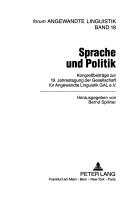
ISBN: 363142812X Year: 1990 Publisher: Frankfurt am Main : Lang,
Abstract | Keywords | Export | Availability | Bookmark
 Loading...
Loading...Choose an application
- Reference Manager
- EndNote
- RefWorks (Direct export to RefWorks)
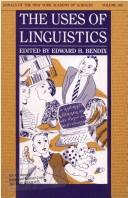
ISBN: 0897665899 0897665902 Year: 1990 Volume: 583
Abstract | Keywords | Export | Availability | Bookmark
 Loading...
Loading...Choose an application
- Reference Manager
- EndNote
- RefWorks (Direct export to RefWorks)
Applied linguistics --- Linguistique appliquée --- Toegepaste taalwetenschap --- Applied linguistics. --- Linguistics --- Linguistics.

ISBN: 1556191006 Year: 1990 Publisher: Amsterdam Benjamins
Abstract | Keywords | Export | Availability | Bookmark
 Loading...
Loading...Choose an application
- Reference Manager
- EndNote
- RefWorks (Direct export to RefWorks)
Applied linguistics --- -Linguistics --- Congresses --- Congresses. --- -Congresses

ISBN: 9027215413 9786613328243 1283328240 9027278180 Year: 1990 Publisher: Amsterdam Philadelphia John Benjamins publishing company
Abstract | Keywords | Export | Availability | Bookmark
 Loading...
Loading...Choose an application
- Reference Manager
- EndNote
- RefWorks (Direct export to RefWorks)
The papers in this volume are divided into two sections. Part 1 Quantitative Linguistics contains contributions by Marie Těšitelová; M. Ludvíková; H. Confortiová; Ludmila Uhlířová; I. Nebeská; Jan Králík; J. Krámský; J. Sabol; J. Štěpán. Part 2 Algebraic Linguistics contains contributions by M. Novotný; Pavel Materna; Eva Hajičová, Petr Sgall & Petr Piťha; Jarmila Panevová & Petr Sgall.
Mathematical linguistics --- Addresses, essays, lectures --- Mathematical linguistics. --- Algebraic linguistics --- Language and languages --- Linguistics --- Linguistics, Mathematical --- Applied linguistics --- Information theory --- Computational linguistics --- Statistical methods --- Mathematical models
Periodical
ISSN: 23794542 Year: 1990 Publisher: Los Angeles, CA : Graduate students of the Dept. of TESL & Applied Linguistics at UCLA
Abstract | Keywords | Export | Availability | Bookmark
 Loading...
Loading...Choose an application
- Reference Manager
- EndNote
- RefWorks (Direct export to RefWorks)
Applied linguistics --- English language --- Applied linguistics. --- Study and teaching --- Foreign speakers --- Foreign speakers. --- EFL (Language study) --- English as a foreign language --- English as a second language --- English to speakers of other languages --- ESL (Language study) --- ESOL (Language study) --- Teaching English as a second language --- TEFL (Language study) --- TESL (Language study) --- Foreign students --- Linguistics
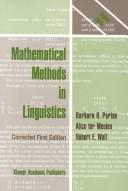
ISBN: 9027722447 9027722455 9400922132 9789027722447 Year: 1990 Volume: 30 Publisher: Dordrecht: Kluwer Academic Publishers,
Abstract | Keywords | Export | Availability | Bookmark
 Loading...
Loading...Choose an application
- Reference Manager
- EndNote
- RefWorks (Direct export to RefWorks)
Mathematical linguistics --- Algebraic linguistics --- Language and languages -- Statistical methods --- Linguistics -- Mathematical models --- Linguistics [Mathematical ] --- Linguistique -- Modèles mathématiques --- Linguistique et mathématiques --- Linguistique mathématique --- Mathematische taalwetenschap --- Mathématiques et linguistique --- Mathematical linguistics. --- 800:311 --- Language and languages --- Linguistics --- Linguistics, Mathematical --- Applied linguistics --- Information theory --- Computational linguistics --- Kwantitatieve linguistiek. Computerlinguistiek --- Statistical methods --- Mathematical models --- 800:311 Kwantitatieve linguistiek. Computerlinguistiek --- Linguistique mathématique
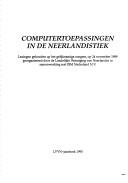
ISBN: 9073479010 Year: 1990 Publisher: Almere : Landelijke vereniging van Neerlandici,
Abstract | Keywords | Export | Availability | Bookmark
 Loading...
Loading...Choose an application
- Reference Manager
- EndNote
- RefWorks (Direct export to RefWorks)
Dutch language --- Computer. Automation --- Dutch literature --- -Flemish language --- Netherlandic language --- Germanic languages --- Data processing --- -Congresses --- Computational linguistics --- -Dutch language --- Automatic language processing --- Language and languages --- Language data processing --- Linguistics --- Natural language processing (Linguistics) --- Applied linguistics --- Cross-language information retrieval --- Mathematical linguistics --- Multilingual computing --- Congresses --- -Data processing --- -Automatic language processing --- Flemish language
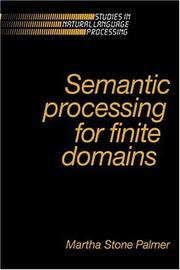
ISBN: 0521362261 052102403X 0511554419 Year: 1990 Publisher: Cambridge Cambridge University Press
Abstract | Keywords | Export | Availability | Bookmark
 Loading...
Loading...Choose an application
- Reference Manager
- EndNote
- RefWorks (Direct export to RefWorks)
A primary problem in the area of natural language processing has been that of semantic analysis. This book aims to look at the semantics of natural languages in context. It presents an approach to the computational processing of English text that combines current theories of knowledge representation and reasoning in Artificial Intelligence with the latest linguistic views of lexical semantics. This results in distinct advantages for relating the semantic analysis of a sentence to its context. A key feature is the clear separation of the lexical entries that represent the domain-specific linguistic information from the semantic interpreter that performs the analysis. The criteria for defining the lexical entries are firmly grounded in current linguistic theories, facilitating integration with existing parsers. This approach has been implemented and tested in Prolog on a domain for physics word problems and full details of the algorithms and code are presented. Semantic Processing for Finite Domains will appeal to postgraduates and researchers in computational linguistics, and to industrial groups specializing in natural language processing.
Lexicology. Semantics --- Mathematical linguistics --- Semantics --- Computational linguistics --- Sémantique --- Linguistique informatique --- Data processing --- Informatique --- Computational linguistics. --- Data processing. --- Sémantique --- Arts and Humanities --- Language & Linguistics --- Automatic language processing --- Language and languages --- Language data processing --- Linguistics --- Natural language processing (Linguistics) --- Applied linguistics --- Cross-language information retrieval --- Multilingual computing
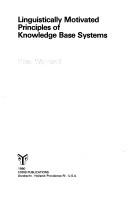
ISBN: 9067654914 9789067654913 Year: 1990 Volume: 12 Publisher: Dordrecht: Foris,
Abstract | Keywords | Export | Availability | Bookmark
 Loading...
Loading...Choose an application
- Reference Manager
- EndNote
- RefWorks (Direct export to RefWorks)
Programming languages (Electronic computers) --- Computational linguistics --- Expert systems (Computer science) --- Semantics --- -Computational linguistics --- Automatic language processing --- Language and languages --- Language data processing --- Linguistics --- Natural language processing (Linguistics) --- Applied linguistics --- Cross-language information retrieval --- Mathematical linguistics --- Multilingual computing --- Programming language semantics --- Knowledge-based systems (Computer science) --- Systems, Expert (Computer science) --- Artificial intelligence --- Computer systems --- Soft computing --- Data processing --- Programming languages (Electronic computers) - Semantics
| Listing 1 - 10 of 19 | << page >> |
Sort by
|

 Search
Search Feedback
Feedback About UniCat
About UniCat  Help
Help News
News